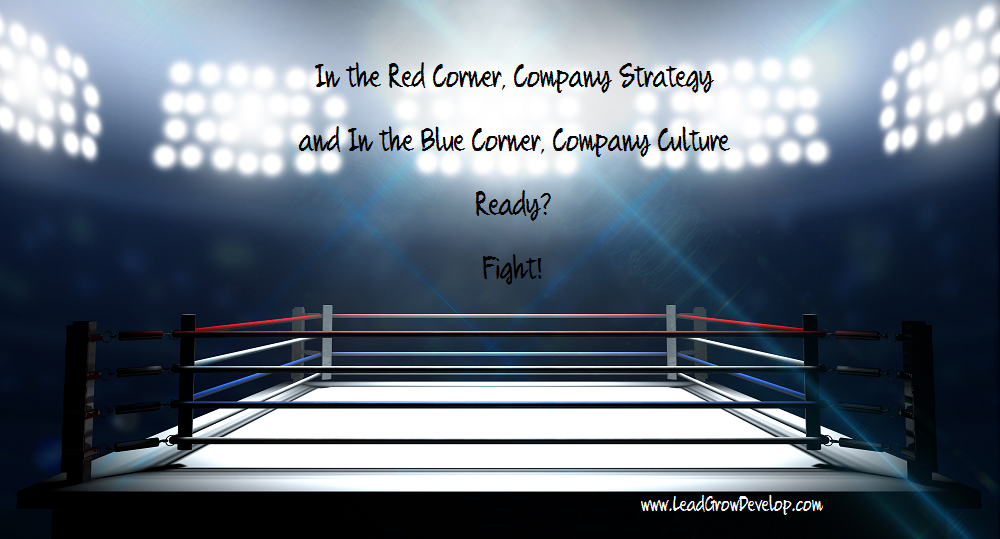I have gone through several Executive level changes in companies that I’ve worked for. Often, when a new Executive is Onboarded, they begin work on creating or changing the Company Strategy. Every single division within the company is scrutinized with a magnifying glass. The Financial department re-looks at how they can cut costs, Operations Department looks at new ways to drive sales and the Marketing department looks at ways to gain new customers. There is a Company Strategy planned for the next month, Quarter, Year and even a 5 Year Plan. What is often overlooked is the importance of the Company Culture.
How important is a Company Culture? If an Organization has a strong strategy, wouldn’t that be enough to succeed?
Let’s compare both sides and let the battle begin.
In the Red Corner, your Company Strategy:
Your business strategy is a summary of how the company will achieve its goals, meet the expectations of its customers, and sustain a competitive advantage in the marketplace. The right strategy will answer questions such as; Why is the company in business? What are we best at doing? Which products/services should we stop offering, continue to offer, or start offering? It is essential to have a clearly defined strategy, there is no doubt about that. You cannot compete in today’s world without one. It is tangible and the results are easily measured.
In the Blue Corner, your Company Culture:
Your Corporate Culture refers to the beliefs and behaviors that determines how a company’s employees and management interact and handle outside business transactions. It is ingrained in the traits of the people who the company hires and tends to develop organically over time.
Take a pause and quickly without thought, name off a few Companies with a Strong Company Culture. Chances are, you thought of at least one of the following companies: Starbucks, Google, Facebook, Zappos, Southwest Airlines, Twitter or SquareSpace. When a candidate applies for one of these companies, they already have a strong idea of what they can expect by working there. Even if you are not in the same field, you have an idea of what to expect. That is how strong their culture is. When one of these companies post a new position, they don’t have to wait a long time before the applications come flooding in.
“Culture holds the power to inspire employees to move themselves, to move mountains, and to support each other in a way that, when done right, is truly irreplaceable. And if you top it off with market-leading products supported by great technology, culture seems to be the most defensible competitive advantage of them all.” – Alyssa J. Rapp, founder and CEO of Inc.
People want to work for a company with personality, but they also want to work for a company that knows how to win in the marketplace. Both take culture and strategy. So in the battle between the two, who wins?
The real winner is the company that aligns culture with strategy. It is when both are combined that companies win in the marketplace. I see culture as the foundation of a house. Without a strong foundation, the house won’t stand up against its harsh environment. When a new homeowner is interested in purchasing a home, he hires an evaluator to ensure there are no surprises. No matter how beautiful the house is, if the house is infested with termites, the potential new owner will probably run away. A poor culture will turn away exceptional employees looking for a solid foundation. A Company’s Strategy is the house’s furniture and decoration representing who the homeowners are.
Do you place more importance on culture or strategy?

